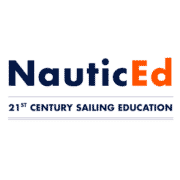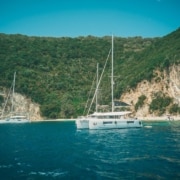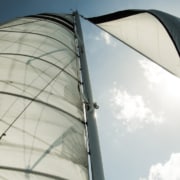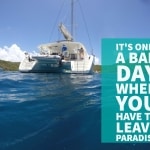How To Bareboat Charter – Question
Here’s a question from a potential student about how to bareboat charter a yacht. It’s such a good and typical question that I’m posting the answer here.
QUESTION >>>>
Hi,
My girlfriend and I are interested in getting our bareboat certification. Growing up I sailed small Sunfish/Lazer style sailboats on lakes, I have extensive power boating experience and we both went on a two-week bareboat trip last spring in the BVI with one of our friends as our captain. We learned a lot on this trip and I was pretty comfortable by the end doing most things by myself besides docking. Most importantly, we had a great time and want to do more of this in the future.
We started looking into taking a liveabaord sailing class this spring so that I could get my ASA 104 certification. But after finding Nauticed, I would much rather do the “schooling” online and use my time this spring to get hands on experience. My question is, if I take Bareboat Charter Master Rank, how much hands on experience would I need to be proficient for bareboating? We want to plan a cruising/learning vacation in the spring but we don’t want to spend half of our time in a classroom. We both have ample time this winter to put into your programs. After completing nauticed online courses could you suggest a place for us to get some good hands on experience? Any examples of how this could work would be greatly appreciated! Thanks so much for the help!
Tim B
ANSWER >>>>>
Tim,
Great question. You’re in the same boat (pun partially intended) as soooo many people.
Bareboating is a dream vacation for most people however I think the intimidation of the thought stops most in their tracks and it goes into the “next life time” bucket. So I applaud you for pursuing this. The reality is that it can be done safely and simply but as you’ve also pointed out there is education that needs to be done.
You’ve also correctly pointed out that there is knowledge and there is experience. Both are different yet intertwined tightly. Knowing what to do on a boat is one thing but having the experience to cover the unexpected is paramount. IE you’re a new charterer with little experience – you go below to make a drink and step down into 6 inches of water in the salon. What do you do? This has happened on charters where the prop shaft feel right out. On my personal boat a hose came off the basin inside the head area, then when we heeled over massive amounts of water (two inches over the floor boards) poured into the boat through the stop cock valve. That one took a very long time to figure out. How about a simple thing like when a crew member lets go of a halyard and now it is flying 20ft up in the wind – how do you retrieve that? The list is semi infinite.
Thus Education through NauticEd combined with time on the water is required and it’s why we added the free online practical sailors logbook to our certification. We’re the only certification in the world that does this and recognizes the importace of practical time. And “Time” does not just mean a weekend or two on the water. Some organizations issue a bareboat certificate by passing a theory course and having two weekends out – that’s pretty absurd. Bareboat charter companies DO NOT accept that blindly as their prerequisite. They require an extensive practical boating resume that they review for every charterer.
So … more specifically to answer your question – you NEED to have time on the water. We designed our Bareboat sailing certification so that you must have 50 days of experience on the water. Half of which as master of the vessel and half of which on a sailboat 28 ft long or greater. But Bareboat charter companies may accept a resume that is less impressive than this. Always, the decision to accept is up to the Bareboat company.
We just decided to set the standard high because we think its the right and safe thing to do. So always always keep your logbook up to date.
Here is what we recommend – Get and pass the NauticEd Bareboat Charter Master bundle of courses. These include an extensive set of courses as follows:
- Skipper ( The basics and fundamentals of skippering a vessel)
- Maneuvering Under Power
- Anchoring
- Coastal Navigation
- Bareboat Chartering
- Electronic Navigation
The total study time involved will be over 50 hours. This is a ridiculously low and insignificant cost (compared to the charter cost, flights, booze, food, hotels) of $US175. On top of that, simply having the knowledge is going to make your vacation go a lot smoother, safer and much more enjoyable for you and the crew. That cost is invaluable. We also recommend that you send you crew through the bareboat charter course prior to the trip. This gives them the knowledge of boat operations like how not to stuff up the head (whereby you as captain will have to clean it) or how to change water tanks or how to give proper signals to the helm when dropping anchor or picking up a mooring ball … again etc etc.
Next – part of our bareboat certification also has embedded an optional checkout/training/verification by a qualified sailing instructor. The instructor will digitally stamp your certification once they deem you as a competent skipper. This goes along way towards resume acceptance for charter companies.
Finally – we talk about getting the experience. There are a few ways and you don’t have to own a boat to do this AND it’s fun and cheap. The easiest is to join your local yacht club in fact you may not even need to join. Just post a notice on the yacht club board that you’re willing to crew in some regattas. Write down who you are what you’re looking for, that you’re a nice person and play well with others (If you don’t play well with others – then read some books on how to be nice. Dale Carnegie’s book “How to win friends and influence people” is the best).
When you race on a boat, your learning curve goes exponential. Everything that can go wrong will and you’ve got 1 second to fix it.
Another way to get time is as easy as this: When I ran a large member based sailing club, the biggest reason people would quit is that they didn’t have friends to sail with. How awful! In reality though I think they just didn’t invite people (See Dale Carnegie above). Now a friend of mine had it down best. He would call me and say “Grant, I’m going sailing today on your boat, I think you should come.” Now there was no way he had permission to take my boat out so my only option was to go sailing with him and in that he was gaining the experience. What I really mean here is that if you don’t own a boat – I guarantee that if you call someone that has a boat and ask if they want to go sailing, they will take you out – GUARANTEED – ALMOST EVERY TIME. NO, REALLY! Chances are they don’t have someone to sail with much of the time. As you develop the relationship further you can simply ask that you’re trying to get your hours up and would they mind if you were the technical master of the vessel for that day. Then you can log those days in your NauticEd logbook as master.
I’m pretty sure that answers your question on how to bareboat charter in the most practical manner. The important thing to do is to just start now on building your resume with theory courses and listing/ logging your experience.
Here’s the link to the Bareboat Charter Master bundle.
Sincerely
Grant








